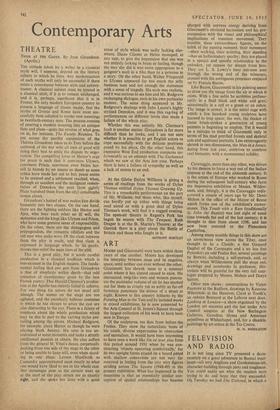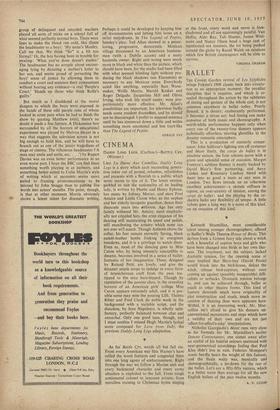TELEVISION AND RADIO
IT is not long since TV presented a docu- mentary on a great adventure in Borstal treat- ment—all very Anglican and Gordonstoun-ish, character-building through piety and toughness. You could easily see what the masters were trying to do and hope that they succeeded. On Tuesday we had The Unloved, in which a
group of delinquent and retarded teachers played all sorts of tricks on a school full of what seemed perfectly normal boys. There were lines to make the blood run cold, like (from the headmaster to a boy): 'My name's Manley. Call me that. We think "Sir" is a bit too formal.' Or, the boy having been in trouble for stealing : 'What you've done doesn't matter.' The headmaster has no scruple about encour- aging lying by dictating a mother's letter to her son, and seems proud of perverting the boys' sense of justice by allowing them to conduct a court and sentence their companions without hearing any evidence—a real 'People's Court.' Hands up those who think Rolfe's guilty.'
But much as I shuddered at the moral dangers to which the boys were exposed in the hands of these odd people (one of whom looked in acute pain when he had to finish the show by quoting Matthew xviii), there's no doubt it made a fine feature. A Dickensian boy surrounded by all the horrors of educational experiment was played by Melvyn Hayes in a way that suggests the television screen is not big enough to hold him, and he will have to branch out as one of the junior tragedians of stage or cinema. The villainous headmaster ('A man may smile and smile, etc. . . .') by Rupert Davies was an even better performance in an even worse part. I hope the BBC can find them something worth playing in a partners, and something better suited to Colin Morris's style of writing which at moments seems more suited to framing pronouncements to be Intoned by John Snagge than to putting live words into actors' mouths. The point, though, is that at other moments Morris obviously
if" shows a latent talent for dramatic writing. Perhaps it could be developed by keeping him off documentaries and letting him loose on a serial melodrama. In The Legend of Pepito, Sunday's play, Ted Allan showed us a peace- loving, progressive, democratic Mexican village threatened by an American business- man (with a Dublin accent) and a nasty hacienda owner. Right and wrong were much more in black and white than the picture, which should have been, for the studio had been filled with what seemed blinding light without pro- ducing the black shadows (see Eisenstein) so necessary to any Mexican scene. Everybody acted like anything, especially Sam Wana- maker, Wolfe Morris, Harold Kasket and Roger Delgado. Jacqueline Hill and Olivia Irving, who took life much easier, were pro- portionately more effective. Mr. Allan's possibilities are important, for television badly needs some resident dramadsts, and he should not be discouraged. I prefer to suspend sentence until he has simmered down a little and writes something more emotional and less tract-like than The Legend of Pepito.
GERALD FAY











































 Previous page
Previous page